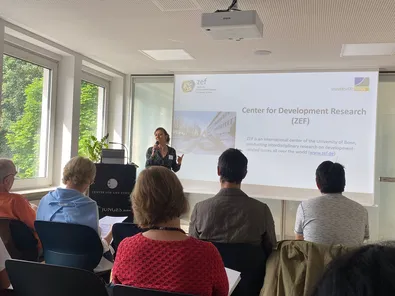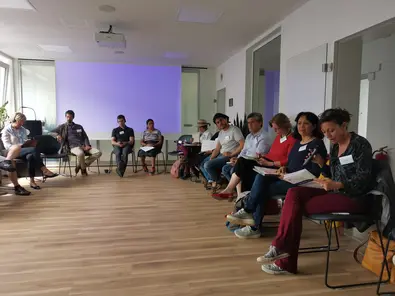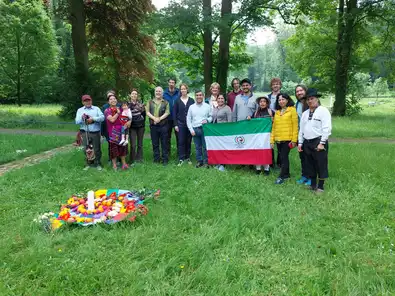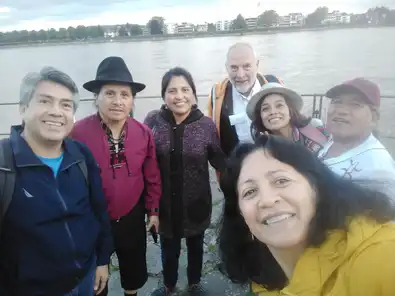Pluriversal Dialogues on Environmental Ethics: Decolonizing Scientific Practice to Build Futures beyond Development
June 11, 2024.
What are Pluriversal dialogues? Pluriversal dialogues can be defined as conversations and processes of exchange among people who have multiple forms and sources of knowledge and experiences. The dialogue concept entails that different knowledges are recognized and valued as equal – also forms of knowledge beyond the Western framework. These include Indigenous, Afro-descendant, and other forms of local and community knowledge. Pluriversal dialogues are practiced within and beyond the framework of debates in post-colonial theory. This implies seeking the construction of a world where many worlds fit by challenging colonial structures - as well as seeking the recognition of epistemic diversity.
In dialogue: Workshop set-up
So how to approach the discussion on environmental ethics from a pluriversal perspective? This was the question researchers posed themselves during the workshop ‘Pluriversal Dialogues on Environmental Ethics: Decolonizing Scientific Practice to Build Futures Beyond Development’ (see program here), which was initiated by and held at the premises of the Center for Life Ethics (TRA 4) in Bonn from May 20 to 24, 2024. Co-organizers were researchers from ZEF, the Transdisciplinary Research Area 'Individuals, Institutions and Societies' (TRA4), the Transdisciplinary Research Area 'Present Pasts' (TRA5), and the Interdisciplinary Center of Latin American Studies (ILZ). The researchers were also interested in whether the decolonial practices of Indigenous people, educators, and activists in Latin America could inform our own teaching and learning practices.
Among the external guests were bilingual (Spanish and native languages) educators from Chile, Guatemala, Colombia, and Ecuador, as well as scholars committed to decolonial research from Bolivia, Colombia, Germany, and Nigeria. Among the activities we conducted were opening and closing rituals led by the Indigenous participants. These rituals consisted of moments of silence, gestures of respect, and expressions gratitude for the opportunity of dialogue and connected us to the purpose of our meeting.
At the core: Sharing experiences and insights
After an outdoor gathering on the first day, Christiane Woopen from the Center for Life Ethics welcomed all guests on workshop day 2 and presented the approach of life ethics. The organizers presented parts of their work related to decolonial critique and practice from the respective academic spaces. From ZEF, Eva Youkhana and Dennis Avilés Irahola presented reflections around the critical role of academia as well as their working paper “Gender studies in development research: a neocolonial agenda?”
The workshop continued with presentations on bilingual teaching practices and local/Indigenous notions and practices of understanding and shaping the world from organizations and initiatives such as 'Pluriversidad Amawtay Wasi, Ecuador', the Catholic University of Temuco, Chile; Crianza y Siembra de Sabidurías y Conocimientos - CRISSAC, the heart of Universidad Autónoma Indígena Intercultural UAIIN-CRIC, Colombia, Consejo Regional Indígena del Cauca CRIC, Colombia; and Escuela Bilingüe Intercultural NIM NA'OJ, Guatemala.
In addition to the presentations by Latin American guests and by the organizers, there were brief presentations by academics in Germany on the concept of common goods, decolonial archaeology, quantum theory, and paranormal phenomena, for example (see attached a short version of the program).
Impressive: Theater of the oppressed
The workshop was enriched by practices of body-expression work (Theatre of the oppressed and systemic constellations) by German activists/artists and oral narratives represented theatrically. In this line, two Colombian participants (Yilson Beltrán and Pablo de la Cruz, both previously funded by ZEF's DSSP program) also guided us in the joint construction of narratives and representations about our conceptions of the environment and the cosmos. The workshop concluded with a joint evaluation and a brainstorming session on potential collaborative projects.
All the organizers perceived this workshop as a foundational stone for developing deeper pluriversal dialogues that can be put into practice in common-benefit projects. There is still a long way to go. Reflections on the content of the workshop are being developed in a blog that is in preparation.
Author: Dennis L. Avilés Irahola, ZEF senior researcher, e-mail: davilesi@uni-bonn.de
Program here.






